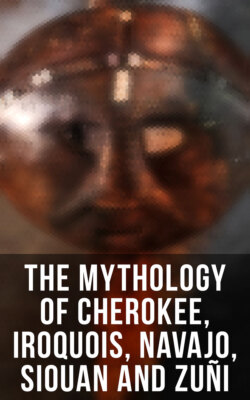Читать книгу The Mythology of Cherokee, Iroquois, Navajo, Siouan and Zuñi - James Mooney - Страница 10
На сайте Литреса книга снята с продажи.
Welsh-Speaking Indians
ОглавлениеAn ethnological connexion has been traced for the Red Man of North America, with equal parade of erudition, to Phoenicians, Hittites, and South Sea Islanders. But one of the most amusing of these theories is that which attempts to substantiate his blood-relationship with the inhabitants of Wales! The argument in favour of this theory is so quaint, and is such a capital example of the kind of learning under which American ethnology has groaned for generations, that it may be briefly examined. In the author's Myths of Mexico and Peru (p. 5) a short account is given of the legend of Madoc, son of Owen Gwyneth, a Welsh prince, who quitted his country in disgust at the manner in which his brothers had partitioned their father's territories. Sailing due west with several vessels, he arrived, says Sir Thomas Herbert in his Travels (1634), at the Gulf of Mexico, "not far from Florida," in the year 1170. After settling there he returned to Wales for reinforcements, and once more fared toward the dim West, never to be heard of more. But, says the chronicler, "though the Cambrian issue in the new found world may seeme extinct, the Language to this day used among these Canibals, together with their adoring the crosse, using Beades, Reliques of holy men and some other, noted in them of Acusano and other places, ... points at our Madoc's former being there." The Cambrians, continued Sir Thomas, left in their American colony many names of "Birds, Rivers, Rocks, Beasts and the like, some of which words are these: Gwrando, signifying in the Cambrian speech to give eare unto or hearken. Pen-gwyn, with us a white head, refered by the Mexicans to a Bird so-called, and Rockes complying with that Idiom. Some promontories had like denominations, called so by the people to this day, tho' estranged and concealed by the Spaniard. Such are the Isles Corroeso. The Cape of Brutaine or Brittaine. The floud Gwyndowr or white water, Bara bread, Mam mother, Tate father, Dowr water, Bryd time, Bu or Buch a Cow, Clugar a Heathcocke, Llwynog a Fox, Wy an Egge, Calaf a Quill, Trwyn a Nose, Nef Heaven; and the like then used; by which, in my conceit, none save detracting Opinionatists can justly oppose such worthy testimonies and proofes of what I wish were generally allowed of."
